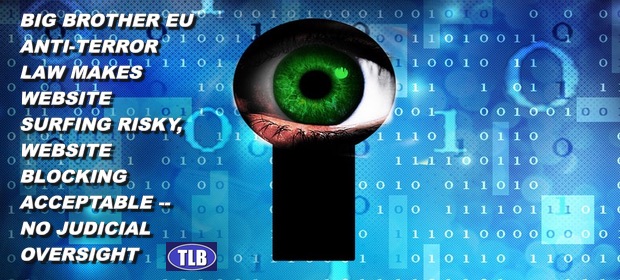
EU terror law risks making protest a crime
NIKOLAJ NIELSEN
A new anti-terror law backed by EU states contains rules that could be used to crack down on civil dissent.
Endorsed at the political level on Tuesday (30 November) by most EU states, the directive on combating terrorism has riled human rights activists for its vague notions of terrorism.
The bill borrows heavily from recent laws in France that allow the authorities to tell internet firms, without any judicial oversight, to block sites that “glorify” terrorism.
But those measures have already led to a series of embarrassments and errors.

France and Belgium have deployed soldiers to patrol streets in the wake of the terror attacks (Photo: Reuters)
Orange, a French telecom firm, shut down Google and Wikipedia for an entire morning in October in France. Both had been added to Orange’s terror watch list. People were instead redirected to a French interior ministry website, where their IP addresses were then flagged.
“There is no list of blocked sites and there is not right of appeal, until pretty much after the fact,” said Adrienne Charmet, spokesperson at La Quadrature du Net, a Paris-based digital rights NGO.
“Once we start accepting this type of blocking, it is difficult to stop expanding it to other subjects,” she noted.
David Thomson, a French investigative journalist who works on jihadism, has also had his Facebook account blocked several times.
France had also passed a law in June that makes it a crime to visit a so-called terrorist website. The country has since incarcerated around 20 people.
“It is used to detain or imprison individuals without any proof of them being dangerous or being radicalised,” said Charmet.
“It presupposes intent. If you just want to consult a website, does that make you a terrorist?”
The EU directive on combating terrorism contains similar provisions. Internet firms are tasked, on a voluntary basis, to remove the content once asked by the police.
But some view the “voluntary” aspect as a means for authorities to work around human rights laws.
“It is legitimising concepts, firstly, that blocking is an acceptable strategy, in the absence of any agreement on what blocking is. It is legitimising the notion that it can be done outside the legal framework on a voluntary basis by the internet companies,” said digital rights advocate Joe McNamee at the Brussels-based EDRi.
The full text of the bill has yet to be made public given that it still needs to be voted through the EU parliament in December.
But the latest text, dated 24 November and seen by this website, appears to have evolved somewhat.
Lawmakers have added a last minute so-called recital to ease the burden on internet firms, noting they can’t be held responsible for hosting terrorism content they are not aware of.
It also notes that the intention of the directive is not to ask the firms to pro-actively block anything that could look like terrorism.
Not everyone will be happy with that. Rachida Dati, a French centre-right MEP and former justice minister of France, had wanted sites to be deemed complicit of terrorism if they failed to remove content fast enough.
Google removed 92 million videos related to terrorism and or to hate last year alone.
“These two violations only account for 1 percent of content that was removed,” a Google representative told MEPs earlier this week.
Civil disobedience – a new crime
But what constitutes terrorism today, in the context of the fight against Islamic state operatives, is also likely to evolve over time to mean something else ten years from now.
Marloes van Noorloos, assistant professor of criminal law at Tilburg University in the Netherlands, noted for instance that “any glorifying remark you could make about Nelson Mandela or Che Guevara, in principle, it is part of the definition”.
The EU directive notes that a terrorist offence includes “seriously destabilising” a whole set of vague structures from the “political” to “economic”.
Rights groups like Human Rights Watch say such efforts gives governments way too much leeway to misuse the directive.
Another big worry is that the directive requires states to criminalise an accumulation of preparatory acts that may have a minimal or no link to terrorism.
The bill makes it a criminal offence to travel to join the ranks of the Islamic State militant group, or to receive training for terrorist purposes.
But Human Rights Watch says the broad wording behind the offences are likely to lead to a violation of rights.
***********
ER recommends other articles by EUobserver
About the author
Nikolaj Nielsen is a journalist at the EUobserver
 Find out about our great (WOW) TLB Project Membership package and benefits, add your voice and help us to change the world!
Find out about our great (WOW) TLB Project Membership package and benefits, add your voice and help us to change the world!




